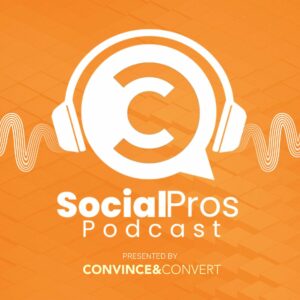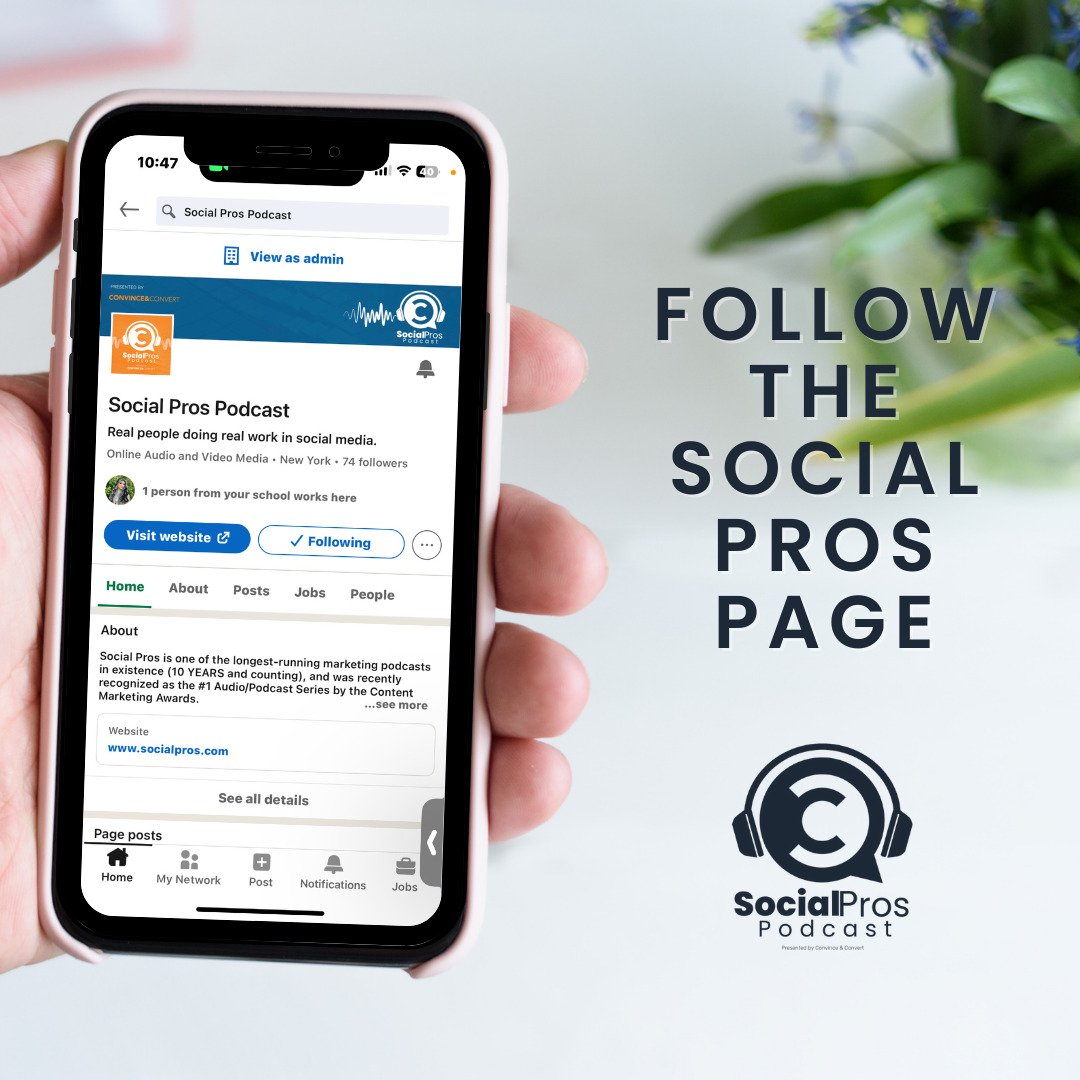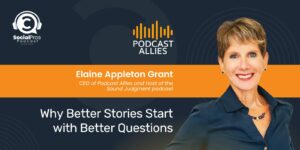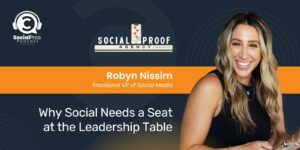Hosted By
About Social Pros Podcast:
Social Pros is one of the longest-running marketing podcasts in existence (10 YEARS and counting), and was recently recognized as the #1 Audio/Podcast Series by the Content Marketing Awards.
Our purpose? Making sure that we speak to real people doing real work in social media.
Listeners get inside stories and behind-the-scenes secrets about how teams at companies like Google, Reddit, Glossier, Zillow, Lyft, Marvel, and dozens more, staff, operate, and measure their social media programs. With 600+ episodes, the Social Pros Podcast brings the humanity of social media to the forefront, while providing incredibly useful marketing strategies that listeners can immediately implement.
Follow Social Pros on LinkedIn.
To inquire about becoming a guest or show sponsor, please email our Executive Producer, Leanna Pham, at leanna@convinceandconvert.com.
Apple Podcast Reviews:
The Social Pros podcast has quickly become a favorite in my feed! I'm consistently impressed by the engaging conversations, insightful content, and actionable ideas. I truly learn something every time I listen!
@Arlie KThis is absolutely an awesome listen for anyone in communications or social media!!
@Will31CThis podcast has become one of my staple weekly podcasts for learning about marketing! Love the conversations that they have and it's always enjoyable and educational!
@Simonstone95Love the podcast - informative, in depth and spot on for any business size.
@MissTriathlon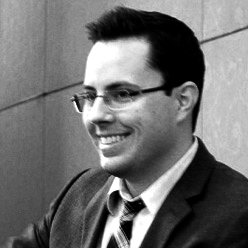
Jason Keath of Social Fresh joins the Social Pros Podcast this week to tell us about the blooming success of Social Fresh and how to run a more efficient, interesting conference. Read on for some of the highlights or listen below for the full podcast. Listen Now Click the play button to listen here: [podcast]http://socialpros.podbean.com/mf/web/kqs6gf/SocialProsEpisode37.mp3[/podcast] […]

Jason Keath of Social Fresh joins the Social Pros Podcast this week to tell us about the blooming success of Social Fresh and how to run a more efficient, interesting conference. Read on for some of the highlights or listen below for the full podcast.
Listen Now
Click the play button to listen here:
[podcast]http://socialpros.podbean.com/mf/web/kqs6gf/SocialProsEpisode37.mp3[/podcast]
Download the audio file:
http://socialpros.podbean.com/mf/web/kqs6gf/SocialProsEpisode37.mp3
The RSS feed is: http://feeds.feedburner.com/socialprospodcast
Find us on iTunes: http://itunes.apple.com/us/podcast/convince-convert-blog-social/id499844469
Please Support Our Sponsors
Huge thanks to data-driven social media management software company Argyle Social for their presenting sponsorship, as well as Infusionsoft, Janrain, and Jim Kukral at DigitalBookLaunch. We use Argyle Social for our social engagement; we use Infusionsoft for our email; Janrain is our crackerjack social integration company, and Jim is our guest host for the podcast (and a smart guy).
Social Pros Highlights For Your Reading Enjoyment, Thanks to Speechpad for the Transcription
The Education Gap in Social
Eric: You just wrapped up Social Fresh West in San Diego. How was that?
Jason: It was our first time back to the west coast for Social Fresh conferences in two years, so we were excited to get back over there to San Diego, California. The conference was a great hit. We’d like to continue to raise the bar, and I think we succeeded.

We’ve done around 15 of these events, and this was our 12th city. That kind of gives you the evolution of Social Fresh conferences over our almost four years now. We started out doing a lot of different cities and a lot more events throughout a given year. I think the most we did was in 2010: seven different cities.
Now we’re focusing on doing one big west coast event and one big east coast event: Social Fresh West and Social Fresh East. We’ve started that this year, 2012, and we’ve already planned out for 2013 to do the exact same thing. That’s probably going to be our bread and butter for the next couple years. We’re kind of excited at where that evolution’s going.
Eric: How has your business changed as the business of social media has changed?
Jason: Wow. That’s a great question. That first event was not a business at the time. That was kind of a one-off thing that I was doing to potentially kind of help the industry be able to spend more money on social media in my geographic area, which was Charlotte, North Carolina. So, I foresaw what I thought was an education gap that was kind of stopping people from really investing in social. Then the conference was such a huge success, such great interest. It generated more revenue than I expected. It generated more interest, more enthusiasm, more excitement. I just saw an opportunity to turn it into a business. So, since that first one, I’d say the biggest changes in the industry have been just a maturity growth.
We have always tried to present social media marketing training to educated marketers: people that are spending 50% of their time on social media or know they need to do so. That audience is pretty broad, though. You have brands, small businesses, Fortune 500 businesses, and all kinds of different commitment levels and budgets. I think that breadth of expertise has stayed pretty constant, but the bottom level — entry level knowledge of social media marketing — has continued to rise year after year.
We’ve had to adjust our content accordingly, so our events are much more advanced now. I’d say they’re probably more advanced than most social media marketing conferences, and we enjoy pushing that envelope each year.
Eric: Yeah, you guys do a good job of bridging that gap. Although, it does never cease to amaze me how at San Diego I had someone ask a question about integrating social with Salesforce, clearly a thoughtful question. Then the next question was, “Hey, I’m new here. What does CRM stand for?” In a microcosm, that is exactly what you’ve just described. Do you feel like you’re bridging that gap by selecting speakers or reaching out to specific sponsors? How is it that you’re proactively making sure that these events are valuable for beginners, and also valuable for people that know their stuff?
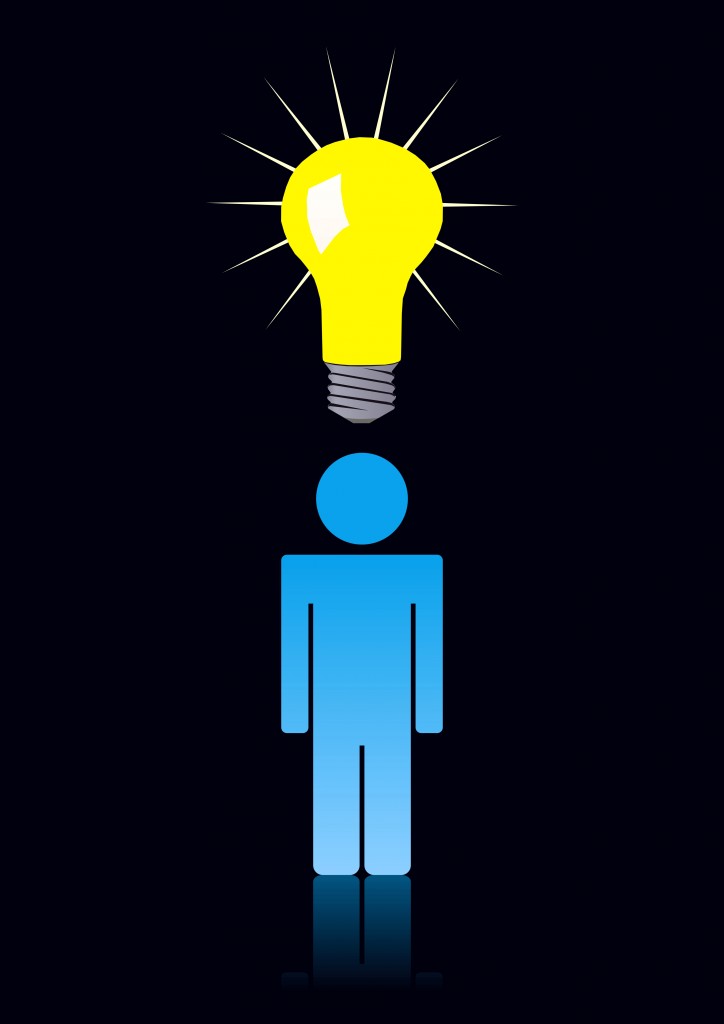
Jason: Yeah. Well, one of the things we’ve always done is we’ve focused on actionable content, which sounds very simple. But the premise of that is we try to write about stuff on Social Fresh that is actionable, whether it’s a list of resources or a list of case studies or a how-to post of where to go next to achieve better Facebook status update results, etc.
That simple guideline for Social Fresh also exists in our conferences. It really does push you to the next level as a training organization, because people start reading your blog because it has actionable stuff. The content is a little more advanced than just covering social media in general, or which celebrity joined Twitter this week, etc.
It sets you apart just enough to where your audience expects a higher level. I’ve always just been very focused on trying to get the most out of our speakers. We’ve done that for almost four years now. I think we’ve really learned what our attendees get the most out of when it comes to speakers.
For instance, we don’t do panels anymore and we do a single track. But those two things work together really well and come from the same assumption, which is that in the beginning when we started doing conferences, it was kind of a crutch to have more people on stage. You throw more speakers up on stage, you feel like it’s better content or better potential for content, or more options for the attendees so they can figure out what’s best for them, etc. What you’re really doing is you’re taking the pressure off all those speakers where they don’t perform as well. If you put one person on stage at one time in front of a full audience of your conference, they own the stage, so they can present whatever they want. But they also have the full, 100% responsibility to deliver some type of value.
It’s not that a panel can’t be great. It can be. But it’s just a lot of work to turn a panel into great content. I can find a great speaker and put them on stage, limit them to 30 minutes, and they’ll really focus on a topic. They’ll really drill down to a topic. We’ll find the right topic to them that aligns with what we know the professional social marketers in our audience want. So, we’ve really just tried to focus things. Having a single track, not having panels, having even shorter sessions — all of those things kind of combine to allowing us to focus more actionable content to our fans and to our attendees.
Not Just Social: SEO and Email Marketing
Eric: Changing gears, Jason, you have this social product that you market through social channels. I always find that there’s an interesting interplay there. This is a really applicable question for our listeners. How do you use social in particular to fill up the seats at these conferences?
Jason: It’s interesting. We have a vested interest in experimenting and growing our community on social networks, on our blog, investing time in that. But if I’m completely honest, we invest more in SEO and content marketing — which does feed social media wealth and is an integrated part of social media in a lot of ways, but I would argue is a separate discipline, as well as offline community building.
Almost four years ago when we started the blog, most of our traffic was from Twitter. The first conference was pretty much all marketed on Twitter because that’s where the community was at the time. It was very much a crowd-sourced thing. Today I’d say up to 60% of our traffic on the blog is SEO-driven. Today, from Twitter is probably 10% of our traffic.
Eric: Wow, down from 100% a few years ago for the first conference?
Jason: Yeah. So, I mean, we take a very digital, holistic approach to our own marketing. I think that’s what most businesses do and should do. I think email marketing and SEO are two things that are still extremely valuable. Social is an important piece of what we do, especially in the experimental arena and communicating with our biggest fans. But it’s not necessarily what we spend the majority of our time on.
Eric: Certainly. I will say that social does contribute to the at-conference experience, right? For Social Fresh West you had an incredibly active Facebook group. Any talk I’ve ever given to a social media group, conference or whatever, I’ve made sure to optimize my slides for the Twitter back chatter.
 I think a lot of people discount the value that that adds because it takes people away from the face to face and the in-moment stuff, but I love it. I think it makes for a great experience and really adds a lot to conferences that I’ve attended in the past. You guys do that really well at Social Fresh.
I think a lot of people discount the value that that adds because it takes people away from the face to face and the in-moment stuff, but I love it. I think it makes for a great experience and really adds a lot to conferences that I’ve attended in the past. You guys do that really well at Social Fresh.
Jason: When you have social media professionals, professional marketers getting together to learn something, you can’t expect that they’re going to sit there and not talk about it online. So one of the things we try to do is we try to channel it into a hashtag conversation and into a Facebook group, which works really well.
I think for us the biggest value out of that is building the community at the physical event. So while we’re at the event, getting people into the Facebook group, getting people to meet each other online. It continues after the event. The biggest thing for us is to grow that community, because I’m a firm believer that group learning is more successful than an individual learning on their own. So, getting people to talk to each other in the sessions, building in time for that, getting people to try things actionably at the event, I think those are a big part of actually retaining knowledge to cement some of the knowledge that the speaker’s trying to give you from the stage.
“Fresh Storm” – Group Strategizing
Eric: You guys had a big experiment at Social Fresh West with your Fresh Storm Brainstorm.
Jason: Yeah, it was an experiment. Everybody wants to do actionable stuff, and we really do learn more when we’re trying things, when we’re writing down stuff, when we’re connecting with other human beings face to face. But it’s been really difficult for us to find a way to do that at the conference that works well for our goals. I think we really hit it out of the park, to reuse that analogy, at this last event, because we did something called Fresh Storm, which is short for the Social Fresh Brainstorm.
It was basically a small group brainstorming activity for a non-profit that we selected, Compassion International. They’re pretty good at social already, which is what we were looking for. We got together, did a little brief to the whole audience, hundreds of social media marketers in San Diego. Gave them about an hour and a half to work together in eight-person teams and come up with a social media strategy based on the goals that Compassion had. We had them do two-minute YouTube videos to pitch their strategy to the nonprofit.
It was really successful. The groups loved it. People wanted it to happen on the second day of the conference as well. We had some really impressive results from the strategies that came out. I think the biggest goal for us was to get people thinking on their feet at the event, to take some of the knowledge that they had already gotten from speakers like yourself, Eric, at that day of the conference.

They really put it into practice with a team of like-minded people, a team of other social marketers from other disciplines, whether they’re just learning or whether they’re a full-time social marketer at an agency, a brand, a vendor, whatever. Getting these people together who don’t normally work together and allowing them to test out their brainstorm skills in a new place, it worked really well. We were excited by it.
Eric: I’ll echo that. It was a great addition to the event. Like you, I was taken aback by the quality of some of the pitches. Most of them look like they were shot with iPhones, but a lot of people I guess ran them through iMovie and put text overlays and music intros. It was really, really good. I was really surprised at how seriously people took it and how well they did.
Jason: Yeah, and there were music backgrounds. There were people doing voice-overs. There were people doing scripted acting moments. It was really good, and I think we really saw the potential of something like that and we were struck by it. In our post-conference feedback that we do at every event — which is a big part of why I think our events improve, because we pay a lot of attention to it — that was the number one rated thing. It was rated higher than any speaker. It was rated even higher than the conference was as a whole.So, it was by far the most successful thing we did at that event. We’re definitely going to listen to that and probably improve on it, make it a bigger part of our next conference, which is in Tampa, Social Fresh East, in April. I’m excited kind of by the opportunity of that direction. It won’t necessarily take over our conference or anything like that, but I think it was an important kind of breakaway from sitting there listening to speakers.
Social Media Stat of the Week: Social Reduces Meetings by 25%
Jim: The Wall Street Journal has an article from Tech Europe, called “Social Media Holds Key to Unlock $1.3 Trillion.” According to research by Salesforce across its customer base earlier in the summer, the key collaboration statistics from going social were – and they list a whole bunch of them, but the one that we found in there that we thought was interesting was a 25% reduction in meetings.
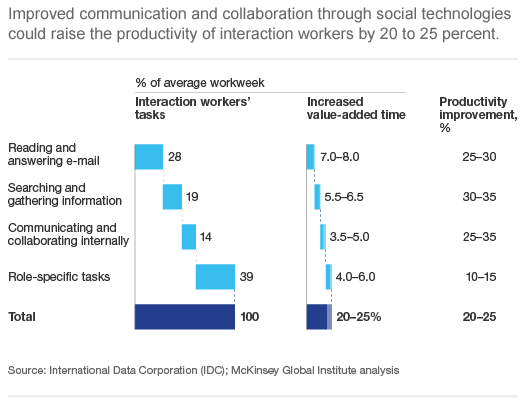
Eric: That is the kind of concept I can get behind. Who cares about $1.3 trillion? Talk to me about meeting reduction. That does make a lot of sense. There’s a lot of good stuff in here. The article goes into pretty deep detail on social as the next wave of ERP (enterprise resource planning) for business.
Social Pros Shoutout
Jason: Since we are on a podcast, I wanted to mention that DJ Waldow just came out with a new podcast today. It’s called Work Talk Show. They’re talking about not just marketing stuff, but how to work smarter, probably a lot of similar to Life Hacking stuff, how to use email more intelligently, things like that. Tom Webster, who you guys know very well, is their first guest. So, I’m excited to see what he does with that. DJ is a very excitable guy, a lot of knowledge to pass along, so that should be pretty fun to see what he does with his new podcast.
Eric: Right on. Actually I recommended to DJ the Blue Snowball microphone that I use to record Social Pros. It’s going to be great. DJ is a hilarious, hilarious guy. Nick Westergaard is no slouch himself.
Jason: Yeah, so that’s pretty exciting. Then the one other thing I had, one of the blogs we work with at Social Fresh is Social Business News by Michael Brito. It dovetails really well with what you were talking about with the Wall Street Journal fact. Social business is the next revolution that social media’s going to be involved in. It’s kind of the revolution inside of the business, compared to the social marketing outside of the business. Brito documents it very well, so I encourage people to take a look at that if they’re interested in that topic.
Eric: Awesome, good stuff. Jason, thank you very much my man. Appreciate you joining the call and giving us the scoop on Social Fresh.
See you next week!
